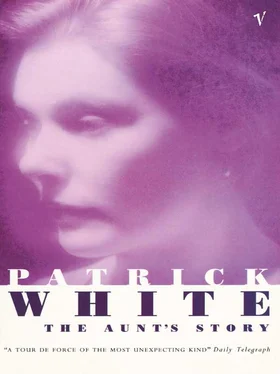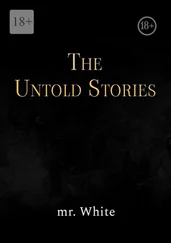‘ Elle dort. Quand même ,’ said her loud voice.
‘Who?’ Theodora asked.
Before she saw. She saw the propped head of Mrs Rapallo lolling in sleep.
‘ Elle dort. Elle rêve ,’ said Henriette, with a touch of dry bitterness. ‘ Elle prend ses rêves d’un petit paquet sur la commode en marbre à côté de son lit .’
Taking it for granted as part of Henriette’s superior knowledge, because these were details that the light did not explain, Theodora glanced through the doorway at Mrs Rapallo’s sleep. Now, disguised by nature, the lips were pale. The eyes were inward-looking things of china. Overhead, on the great branching brass of the bed, hung Mrs Rapallo’s hair, against which a shabby Mignon dozed, and huddled for warmth. It was a cold tree.
Henriette laughed. ‘ Vous voyez? ’
She had a gold tooth that gashed. It is quite hateful, decided Theodora, the gold tooth of Henriette. And the eyes, cavernous from long looking, at a distance, through doorways at night.
‘ Ce vieux cadavre vit encore. Quand même ,’ laughed Henriette. ‘Elle rêve.’
‘Thank you. I have seen enough,’ said Theodora.
And it was not so much Mrs Rapallo as the cavernousness of Henriette.
‘ On y va, on y va ,’ said Henriette, also a servant who sensed very quickly the whims of guests.
They had, in fact, arrived. Henriette threw open again Theodora’s chambre modeste .
It was perhaps plus modeste , but recognizable, from the objects she had put there in the morning as a safeguard, the darning egg, the dictionary, and the superfluous leather writing case. Hearing the fainter slippers of Henriette, listening to her own silence form in the small room, Theodora loved her sponge. There are moments, she admitted, when it is necessary to return to the boxes for which we were made. And now the small room was a box with paper roses pasted on the sides. Theodora walked across the carpet, frayed by similar feet in modest circumstances, with arches that have a tendency to fall, in shoes that soon must be mended. She took off a garnet ring which had been her mother’s, but which had changed its expression, like most inherited things. She put it on the dressing table, inside the handkerchief sachet, which was the garnet’s place. I am preparing for bed, she saw. But in performing this act for the first time, she knew she did not really control her bones, and that the curtain of her flesh must blow, like walls which are no longer walls. She took off one shoe, with its steel buckle and its rather long vamp. Standing with it in her hand, her identity became uncertain. She looked with sadness at the little hitherto safe microcosm of the darning egg and waited for the rose wall to fall.
It began to palpitate, the paper mouths of roses wetting their lips, either voice or wall putting on flesh. She was almost indecently close to what was happening, but sometimes one is. Sometimes the paper rose has arms and thighs.
Theodora realized she must accept the tactile voices of the voluble wall.
‘When I look into your eye I can see myself,’ said the voice.
‘That is why you are so necessary to my existence.’
It was the voice of Wetherby, Theodora heard, the breath so close it touched the bones of her cheek.
‘But small,’ said Lieselotte. ‘The eye reduces as well as intensifies. That is why you hate. Because it shows an amoeba, or anyway, some small, squirming thing.’
Hot hands twisted paper roses. Sweat had begun to penetrate the paper wall. It spread, larger than Africa, lapping the dry surface with thick, swollen, African lips.
‘If I put my hands like this,’ Wetherby said.
‘You would not dare,’ said Lieselotte. ‘You would remove the source of all your despair and satisfaction. If I were to die of just this extra pressure, which your hands have not the courage to give my death would mean your suicide. You must continue to suffer, slowly, by any and every dreary means, to feel the numbness and desperation of what you choose to call love.’
The hands were making a cage, Theodora felt, the hand in hand, from which temporarily the bird had flown.
‘And yet you have loved me. You have told me so,’ Wetherby said.
‘I have given you what I have been given,’ Lieselotte sighed. ‘Surely by this time you must understand we have entered the age of Ersatz .’
‘But I have felt something stronger in your arms.’
‘That,’ said Lieselotte, ‘is pity.’
‘But it is also love.’
‘Have it your own way. It is also contempt. It is also power.’
‘But you love your power. I can feel it in your mouth, in your moments of greatest revulsion.’
‘Of course I love power. Who doesn’t? And best of all I love the power that pity gives. Once the object of pity accepts, he is lost. The rot has set in. You should know, shouldn’t you? You! You! You!’
‘I know because I love you.’
‘Because you love pity. You crave for it. There! Take it. There!’
Whether blows or kisses it was not clear.
‘And you crave to give.’
‘Well?’
‘You have confessed your weakness. You are dependent on me.’
‘Oh, God, yes, I am dependent on you all right. If you put it that way. To the end. To the end.’
So that it is no longer possible, sighed Theodora Goodman, to distinguish which is which.
Love is undoubtedly an acrostic, and that is why I have failed, she decided as she listened to the teeth on teeth grinding out words, and silences give clues. She saw a great stillness replace the frenzy of the paper curtain. She sat with a Testament in her lap, and read the Acts, to prepare herself for sleep, relaxing as Mrs Rapallo had recommended, with a book in which people come and go. But in this book the people came and went with a directness and simplicity that amazed. People no longer come and go, said Theodora, people are brought and sent.
‘Ah,’ cried Lieselotte, her sigh turning on the pillow. ‘Where were we, my love? ’
‘Why, we were where we left off,’ Wetherby replied.
‘I supposed so. Do you know that once I was a little girl with plaits no thicker than cats’ tails? I walked beside the Baltic in a blue dress and looked for the midnight sun.’
‘Do you know, Lieselotte, you have never stopped being a little girl, except that you have learnt to look at objects through a glass eye and then to describe their antics?’
‘The antics of objects are indescribable,’ Lieselotte sighed. ‘I never expect to make more than an attempt.’
‘That is our hope,’ said Wetherby.
‘Hope?’
It was a bubble on her lips in some smooth sea in which she already swam.
Swimming too, somewhere off the shores of an island, Theodora hitched her trousers under the green water and prepared to touch land. Fire was coming towards her, and voices, and finally heads, along the banks of a little creek.
‘Who are you?’ they asked, holding their fire close to the water.
‘My name is Epaphroditos,’ said Theodora, rising shakily on sudden stones.
Wind twanged in her moustache, which was thick with salt.
‘That is strange,’ they said. ‘You are unexpected, to say the least.’
‘Well, I cannot tell you any more,’ said Theodora. ‘Because I am waiting to be told.’
Before her stone rolled. She retrieved her head from above her lap in the strict space of her chambre modeste .
‘You are sleeping, Ludmilla?’ asked Alyosha Sergei.
‘I was,’ said Theodora. ‘And you?’
‘Never.’
‘It must be sometimes a great bore.’
‘Everything is boring,’ said Alyosha Sergei. ‘Boredom is a motive force which we are apt to overlook.’
Читать дальше












